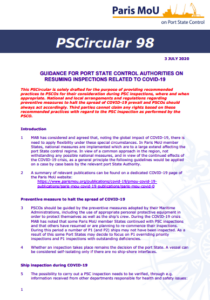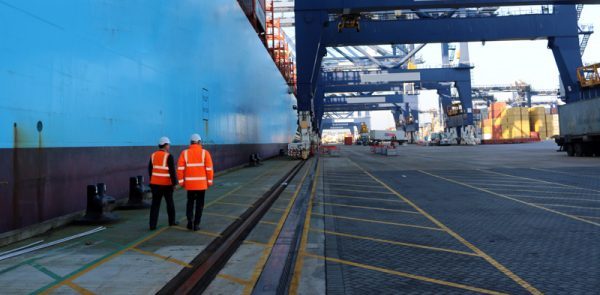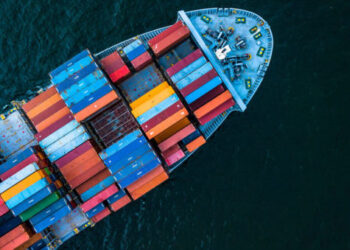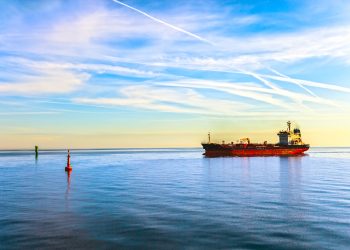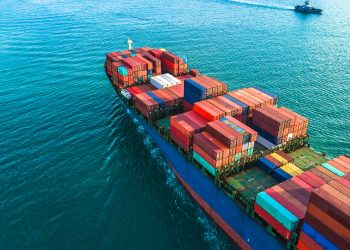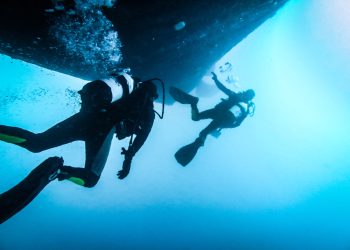Paris MoU reiterated its guidance for PSC authorities on resuming inspections related to COVID-19. The guidelines should be applied, as a general principle, on a case by case basis by the relevant port authority, not withstanding any possible national measures.
Ship inspection during COVID-19
The possibility to carry out a PSC inspection needs to be verified, through e.g. information received from other departments responsible for health and safety issues:
- the Maritime Declaration of Health, MDoH;
- reports from Maritime Police, Coast guard, Pilots, or other local authorities indicating possible COVID-19 contamination or suspicion thereto.
-Ships suspected of COVID-19 contamination
1.Check first if the vessel is not under quarantine by the Local Health authorities;
2. When COVID-19 cases are pre-announced (through the MDoH or other means) the highest precautions should be taken. In these cases always warn the Port Authorities and consult before boarding the vessel. Risks should be assessed and mitigation measures by the port State and the ship should be taken into consideration before boarding the vessel;
3. The PSCO should also make himself/herself familiar with the ship’s protective measures against COVID-19 and the ship’s Outbreak Management Plan for COVID-19;
4. PSC inspectors should preferably be accompanied by qualified staff of the Port Sanitation/Health Offices to assist where technically required;
5. The highest available standards of PPE (Personal Protection Equipment) should be applied (FFP2/FFP3 mask, overall, nitril/vinyl gloves, safety goggles or face shielding mask);
6. Member Authorities may consider that PSCOs having a High Risk Profile (e.g. >60y, underlying medical conditions, undergoing medical treatment, etc.) should not be boarding these vessels.
-Ships NOT suspected of COVID-19 contamination
- PSCOs may board the vessel without assistance
- PPE should be used at standard level, including appropriate masks (e.g. surgical masks, in some countries the PPE standard level might be different and may require other equipment such as FFP2/FFP3 mask).
See also: Paris MoU: Guidance on COVID-19 impact, publicly available
Meanwhile, the COVID-19 related PSC inspections take place under restricted conditions compared to the previous PSC inspections. These restrictions are set out in the next paragraph and focus on the avoidance of contamination between the vessel’s crew and PSCOs and cross-contamination with other vessels.
Guidelines to observe on COVID-19 PSC inspections
1. Contamination reduction by reducing on-board time:
a) The PSCO or PSC administrator should contact the vessel before or through the Agent to make sure that:
- all documents and certificates as set out in Annex 10 of the Memorandum, to the extent applicable, are prepared by the crew and ready in a specific location where adequate social distancing can be maintained, prior to the boarding of the vessel;
- the crew members whom will be interviewed are advised that they will be the only contact persons and will have to be equipped with masks for their own and PSCO safety.
2. Contamination reduction hazard when boarding / onboard:
a) Wear clothing with long sleeves to avoid contact with possibly contaminated surfaces;
b) Always put on PPE before boarding the vessel;
c) First put on your Nitril/vinyl gloves;
d) Then put on your surgical/FFP mask;
e) Try avoiding touching PPE after having put them on;
f) Do not accept any drinks and food onboard, be self-sufficient.
3. Contamination reduction whilst inspecting
a) Before commencing the inspection discuss with the Master about how the inspection will be carried out and the safety measures to be considered and addressed;
b) When boarding isolate the “visitor-pass” in a plastic sealable bag, never put it around your neck;
c) Sign-in only using your own pen;
d) Do not shake hands with the crew;
e) The meeting to review the certificates should be with no more than two crew members, one for deck related matters and one for engine related matters. These crewmembers are the same as the ones accompanying the PSCO during the vessel’s inspection;
f) Maintain an adequate social distance at all times: e.g.1.5m when sitting, 2.5m when moving around, or other distances as determined by national requirements;
g) Contact with other crew members should be avoided whilst inspecting;
h) Crew should also wear appropriate PPE in relation to COVID-19 at all times (e.g. protective masks) during the inspection, in accordance with MLC and flag State requirements;
i) The inspection report should be, if possible, made in an electronic way, signed electronically and mailed electronically to the Master
j) Finish the inspection maintaining adequate social distancing (use as an alternative a head nod, salute, etc …).
4. Contamination reduction whilst leaving the vessel
a) Return the visitor-pass in the bag (do not unpack);
b) Sign-off with own pen;
c) Do not shake hands;
d) Before entering the car, remove all PPE and dump it into a dirt bag. Note: Do not push out the air of the dirt bag when closing it since you may risk vaporisation of the virus whilst not wearing any PPE;
e) Dispose of the dirt bag in a safe way;
f) Proceed with the disinfection of the used material: pen, laptop/keyboard, backpack or bag and hands before entering your vehicle;
g) Preferably wash the clothes at the end of the day at minimal 40°C, or other recommended temperature;
h) Preferably take shower after each inspection.
Important: when performing more than one vessel inspection on the same day always change PPE and disinfect to avoid cross-contamination between the different vessels! Following these steps will reduce the risk of contamination. Since it is not possible to provide absolute certainty, it is additionally advised to use professional judgement where ever risks may be determined, suspected or spotted.
Whenever required, a COVID-19 related inspection shall be interrupted in order to guarantee the safety of the PSCO.
Explore more herebelow:
